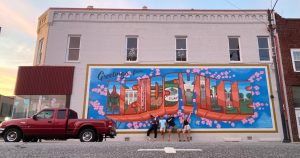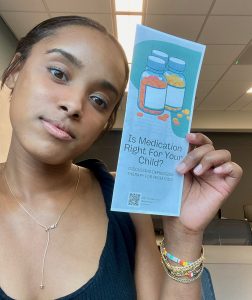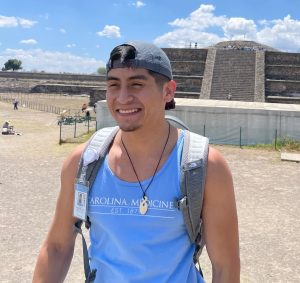
Now entering its 11th year, the Kenan Primary Care Medical Scholars program gives medical students diverse training experiences in rural and urban areas of the state. With primary care shortages in all rural North Carolina counties, the program’s goal is to support and mentor students who are pursuing primary care – and to provide scholarship funds that help them leave school with less debt.
There are lots of medical schools that have rural track programs, but many aren’t fortunate enough to have an endowment like UNC School of Medicine, said Meredith Bazemore, director of UNC’s Office of Rural Initiatives. “We are one of the few rural programs for medical students that has significant scholarship dollars attached.”
Generous support from the Sarah Graham Kenan Endowment and William R. Kenan, Jr. Charitable Trust powers the program, offering both a rural or an urban track for medical scholarship with a focus on primary care.
“The Kenan Primary Care Medical Scholars program emphasizes our commitment to primary care in the state of North Carolina – and the way to do that is to put students in learning spaces all across the state.”
Summer Internships
The heart of the program is a summer internship, with students training in various settings throughout the state. This summer’s rural cohort groups were placed for five weeks in western North Carolina, Wilmington, Rockingham and Caswell counties, along with Moore and Sampson counties. The urban cohort trained in Raleigh under the leadership of Dr. Rasheeda Monroe and Erin Bakal at WakeMed.
Students in their first year of medical school apply for the program. Candidates who tend to be a good match have a commitment to service, said Meredith, and they recognize the need that exists and want to help fill that need.
The program has admitted 83 scholars across 10 years for the rural track. There are now 50 program graduates and of the 50, 42 (or 84%) matched into a primary care specialty. Of that 42, 27 graduates (or 64%) matched into NC residencies.
“We have a lot of students who choose to stay in North Carolina,” said Bazemore.
Paying Down Student Debt
Primary care compensation is less than for medical specialties. Lower compensation and less exposure to rural populations during training creates barriers for medical students who might otherwise be interested in rural primary care.
“We’re paying down their debt while they’re still in school, so they’re still eligible for loan forgiveness programs,” said Meredith. The program’s structure allows students to pursue primary care in a way “that frees them a little more to make that choice without feeling the financial pressure to go into a specialty,” she explained.
“There is a significant shortage of primary care providers across our state – the Kenan Primary Care Medical Scholars program is seeking to meet that need to improve the disparities that exist across North Carolina.”
Kenan Primary Care Medical Scholars: Mya Webb
Mya Webb (MS2, Class of 2025) grew up in Durham and went to Davidson College as an undergraduate, then did neurodevelopment research in Boston before coming to UNC School of Medicine and applying to be a Kenan medical scholar. Her interest in medical school stems from “watching Gray’s Anatomy, when I realized I do really like science and I do really like working with people.” Putting the pieces of science and humanity together in medical school is an ongoing “puzzle,” said Mya.
One big puzzle piece that Mya has already put into place is her certainty about pediatrics. “I want to be in pediatrics, for sure,” she said. “There’s something about taking care of the most vulnerable population that helps me feel I’m doing something good with my life.”

For her summer internship with the Kenan Primary Care Rural Scholars, Mya worked two days a week with Dr. Harrison Mabry at Sandhills Pediatrics in Seven Lakes near Pinehurst. Mya said she was a little nervous going into the internship, but it ended up being an incredibly diverse and positive experience.
Mya’s work this summer gave her a better understanding of the lines that separate different people from needed resources. “You see these very clear lines between those who can pay for medical care, those who rely on Medicare and Medicaid, and those who don’t even know what those resources are,” said Mya. “Seeing how Dr. Mabry juggled the diversity of people coming in and the population differences was very eye-opening for me.”
Mya anticipates that she’ll end up practicing in a rural area, and with pediatrics in her future, she’ll definitely be in primary care.
“I feel like that’s where I’m most needed. At the Seven Lakes clinic there were no Black doctors, there were no Black NPs.” Mya wants Black patients – who made up about 30% of the patients she saw over the summer – to see more Black providers in these roles across rural clinics in North Carolina.
When asked if there was any moment that stands out from her experiences this summer, Mya described seeing a four-year-old who had a rare congenital heart disease and needed a visit from the clinic’s therapy dog to push through his anxiety and fear at seeing doctors only week after surgery.
“I’m so grateful that I got to see how different aspects of life impact medicine, like us having a dog in the clinic – little did I know it would be such a big moment of what we needed. The creativity and the ingenuity you need to get through things like basic physical exams with kids who are going through really life-changing things … that was great to see. I was very lucky.”
Kenan Primary Care Medical Scholars: Ricardo Crespo-Regalado
Ricardo Crespo-Regalado (MS2, Class of 2025) was born in Mexico but soon moved with his family to Pink Hill, NC, where he grew up. He began interpreting for his family during medical visits at a young age, which sparked his interest in pursuing a scientific or medical field. At UNC-Chapel Hill he majored in Exercise and Sport Science, while also wrestling and volunteering at the Student Health Action Coalition (SHAC), eventually becoming the SHAC interpreting director.

Ricardo described Pink Hill, in southeastern North Carolina, as a very rural area with a lot of agriculture. “We were a low-income family and never had health insurance. I ended up interpreting for my parents a lot. In high school I got involved with sports and was very intrigued with all the injuries that go with sports, even things like skin infections.”
As Ricardo progressed through his undergraduate studies he was focused exclusively on orthopedics. But as he got involved with organizations like SHAC and was exposed to what primary care can do for patients, his mindset of why he wanted to go into medicine started changing.
“It’s not just about the science – it’s about the diversity of patients and how many patients you can help and learn from through the career path you’re following.”
For his five-week summer internship, Ricardo worked two days a week with Dr. Aaron “Brad” Thompson in Eden, NC at Dayspring Family Medicine. His research project focused on nutrition and diabetes resources that would be useful for the clinic patients he was getting to know. Ricardo met and spoke with patients about diabetes and helped them understand the resources presented. The brochure he created also included a scripted conversation.
“Conversations are the best way to reach patients, especially because you get to describe medical issues in layman’s terms,” said Ricardo, who wants future patients to have access to his brochure’s clearly presented information on diabetes.
It was a great summer, said Ricardo, and very insightful. “I got to learn a lot through this practice. I was Dr. Thompson’s first student through the Kenan program, but it did not seem like it. He was so willing to teach me, ask me questions, and let me do things.”
Dr. Thompson was a Kenan primary care scholar when he was at UNC School of Medicine. He is one of several previous scholars who are in primary care practice in NC and precepting new program participants.
By the third week in clinic, Ricardo described feeling more confident in how he approached his visits with patients. “I felt more efficient – I wasn’t just checking off checklists, I was really getting to know the patient more. I learned a lot from all the providers, but especially from the patients. The Eden community was so wonderful and welcoming and I really enjoyed being there.”
Ricardo feels the Kenan medical scholars program is doing a great job of piquing interest in primary care specialties and in what rural healthcare involves. “Every provider that works in rural settings knows each other and the community and works together to provide the most comprehensive care for their patients. It’s really humbling to see.”
For more information on supporting the Kenan Primary Care Medical Scholars please contact Jeanine Simmons, Senior Executive Director of Development, Medical Education and Alumni, at jeanine.simmons@med.unc.edu.
